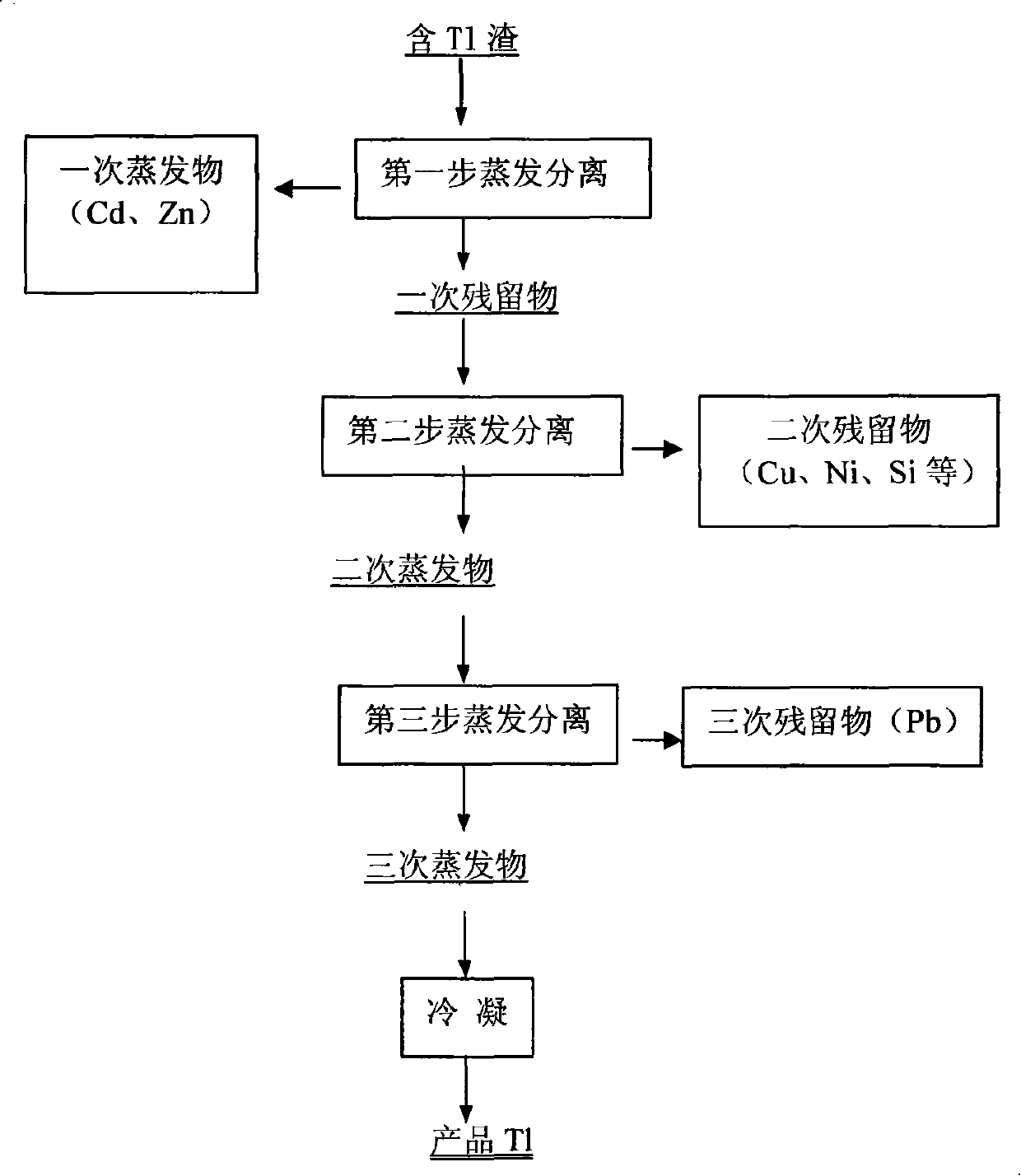Method for extracting thallium from thallium containing slag
A technology for extracting metal and thallium slag, which is applied in the direction of improving process efficiency, can solve the problems of high price and thallium pollution of the electrolytic thallium extraction method, and achieves the effects of flexible extraction purity grade, low energy consumption and simple equipment.
- Summary
- Abstract
- Description
- Claims
- Application Information
AI Technical Summary
Problems solved by technology
Method used
Image
Examples
Embodiment 1
[0013] Example 1: Using thallium-containing slag as raw material, its main components by weight percentage are Cd 60.8%, Cu 2.10%, Ni 3.02%, Pb 1.64%, Zn 0.0056%, Si 0.50%, Tl 24.68%, and vacuum primary separation , control the temperature at 500-550°C, and heat for 30 minutes, among which the temperature is kept at 550°C for 20 minutes, and the vacuum is 8-20Pa. Obtain the primary evaporation containing Cd and Zn and the primary residue containing Tl, with the purpose of enriching as much Tl as possible in the primary residue while removing Cd and Zn;
[0014] Use the primary residue as raw material to carry out vacuum secondary separation, control the temperature at 900-1000°C, and heat for 35 minutes, among which the temperature is kept at 1000°C for 20 minutes, and the vacuum degree is kept at 8-20Pa. To obtain the secondary evaporation containing Tl and the secondary residue containing Fe, Cu, Ni, Si, the purpose is to achieve the enrichment of as much Tl as possible in t...
Embodiment 2
[0016] Example 2: The main components by weight of thallium-containing slag are Cd 59.2%, Cu 2.50%, Ni 2.82%, Pb 1.24%, Zn 0.015%, Si 0.60%, Tl 20.68%, vacuum primary separation, controlled temperature 550- 600°C, heating time 30min, among which 20min at 580°C, vacuum 8-40Pa. Obtain the primary evaporation containing Cd and Zn and the primary residue containing Tl, with the purpose of enriching as much Tl as possible in the primary residue while removing Cd and Zn;
[0017] Use the primary residue as raw material to carry out vacuum secondary separation, control the temperature at 1050-1100°C, heat for 35 minutes, keep the temperature at 1100°C for 20 minutes, and keep the vacuum at 8-40Pa. To obtain the secondary evaporation containing Tl and the secondary residue containing Fe, Cu, Ni, Si, the purpose is to achieve the enrichment of as much Tl as possible in the secondary while removing elements such as Fe, Cu, Ni, Si, etc. in the evaporator.
[0018] Then use the secondar...
PUM
 Login to View More
Login to View More Abstract
Description
Claims
Application Information
 Login to View More
Login to View More - R&D
- Intellectual Property
- Life Sciences
- Materials
- Tech Scout
- Unparalleled Data Quality
- Higher Quality Content
- 60% Fewer Hallucinations
Browse by: Latest US Patents, China's latest patents, Technical Efficacy Thesaurus, Application Domain, Technology Topic, Popular Technical Reports.
© 2025 PatSnap. All rights reserved.Legal|Privacy policy|Modern Slavery Act Transparency Statement|Sitemap|About US| Contact US: help@patsnap.com

